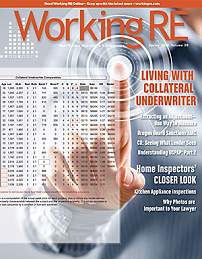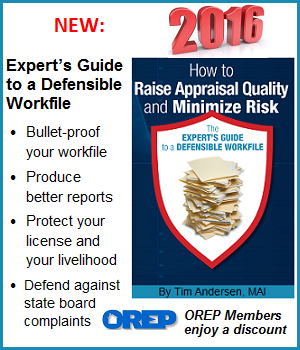 |
>> See Past News Editions >> Click to Print Protect your license and your livelihood with the Expert’s Guide by Tim Andersen, MAI. Click now 2015 AMC Guide Increase orders, turn down low-fee AMC work. Click now |
Editor’s Note: This important decision affects in-house appraisers at any bank or appraisal shop.
Appraisers Entitled to Overtime, Court Holds
by David Brauner, Editor
In May a federal judge in Orange County, Calif. issued a judgment in favor of a class of residential real estate staff appraisers against Bank of America (BOA), rejecting the bank’s defenses and holding that BOA owes wages for unpaid overtime to in-house appraisers at its subsidiary Landsafe. According to lead attorney Bryan Schwartz, as the first order deciding that appraisers are entitled to overtime, this judgment has implications throughout the real estate appraisal industry. The case is Boyd, et al. v. Bank of America, et al., 13-cv-561 (DOC) (C.D. Cal.)
In the case, the Defendants (BOA) argued that appraisers fall under: (1) the federal and state administrative exemptions; (2) the federal and state professional exemptions; and (3) the related federal highly-compensated employee exemption. The Appraisers/Plaintiffs in this case asserted that none of these exemptions apply. Under the Fair Labor Standards Act (FLSA), the minimum wage and maximum hour requirements do not apply to “any employee employed in a bona fide … administrative or professional capacity.”
According to the Court’s 61-page order in the plaintiffs’ favor, “The Court finds that the federal and state administrative and professional exemptions and the federal highly compensated employee exemption are not applicable to appraisers,” said Judge David O. Carter of the United States District Court for the Central District of California.
(story continues below)

(story continues)
The decision also denied the bank’s attempt to strip the workers’ claims arising from denied meal and rest periods and various penalties under federal and state law.
According to Schwartz, the Oakland-based counsel for the Plaintiffs, “This should be a wake-up call to the entire industry. If you haven’t been paying overtime to your real estate appraisers, it is time to start.”
Way It Is
Bank of America settled for $5.8 million in a previous suit brought by review appraisers, who proofread the residential appraisers’ products. The review appraisers recovered an average of over $10,000 each in the settlement, #307 Order Granting Plaintiffs’ Motion for Summary Judgment. According to Schwartz, BOA will owe far more, on average, to staff appraisers in this suit.
James Baumberger, a long-time appraiser and President of Synergy Appraisal Services, an AMC in Mich., says the settlement does not surprise him given how LandSafe operated during his time there. “LandSafe used production quotas for staff appraisers based on total billings, while the quotas for reviewers were based on a point system,” Baumberger said. “At some AMCs, the quotas are generally unachievable in an eight or nine hour work day.”
According to Baumberger, this was the case at LandSafe, where he served as Regional Chief Appraiser for two years. “There were negative consequences if QC reviewers fell short of their required quotas even if they did high quality work. It was fairly common company knowledge that many QC reviewers would work into the evenings, work over weekends, and even on holidays trying to achieve their quotas. QC reviewers regularly worked additional hours, beyond a typical 40-50 hour corporate workweek, to avoid disciplinary actions or termination,” he said.
Baumberger continued, “The $5.8 million settlement paid to QC reviewers for unpaid overtime work (in the previous suit) is not a surprising outcome to me. I am not an attorney but beyond the issue of whether appraisers and reviewers can be paid on an exempt-salary status, it is a highly-suspect business practice to design a system of compensation and performance improvement processes that compels professional appraisers and reviewers to work significant amounts of additional time just to keep their jobs, without compensation and often well-beyond a reasonable corporate workweek.”
At Synergy Appraisal Services, Baumberger said, “We are careful to negotiate win-win production goals with our newly-hired staff appraisers. When a candidate for a staff appraiser position reports his or her typical weekly appraisal production, we often set their quota at one report less per week than they typically produce. We do this to ensure that they have adequate time to produce high-quality valuation services. In addition, the staff appraisers on a salary are paid a bonus for any additional work completed.”
Baumberger thinks many AMCs with staff appraisers will take a close look at their culture, compensation, and production quotas after the wake-up call of this ruling. “If quotas are not based on achievable goals for a reasonable workweek, and there are disciplinary consequences for not reaching quotas, AMCs would be well advised to take corrective actions immediately.”
(story continues below)

(story continues)
Role Reversal
In this case, the parties disagreed about the relative skill and judgment required to be an Appraiser and who argued what may surprise you. Consider this, taken from the Court Documents: “Plaintiffs (the appraisers) insist that the appraisal process simply involves plugging in numbers and other easily observable data based upon clear guidelines in order to generate an estimate as to property value. The Defendants (BOA in this case) argue that an appraisal requires an expert eye, and a keen independent understanding of market conditions, to generate a highly informed valuation opinion. In the Court’s view, the truth lies somewhere in the middle. That is to say, generating an appraisal report requires strict adherence to guidelines limiting variables that Appraisers may consider under most circumstances, and at the same time, requires independent judgment and discretion as to how to select the data Appraisers are required to consider (which comparables in what market area?), how to assess market trends (will closing a factory effect property values in the future?), and generate a final value (what matters more, a sun-deck or a pool; walking distance to a school or a short drive to a grocery store?).”
The Decision continues, “It appears to the Court that what matters, above all, is that Appraisers show their work. With real estate valuation, there is no one ‘right’ answer. A house does not objectively or absolutely ‘cost’ a certain amount. Rather, the value of a home is what one person is willing to pay on a certain day. So an Appraiser gives an informed opinion, not a factual assessment, about the value of the property. It seems that the exact number therefore matters less than the uniform process of getting to the number– a process that B of A can rely on to get supportable results (not results that are necessarily ‘right’ or ‘wrong’). In the end, an appraisal is one piece of data that BofA considers in making its own judgments about its loans. Those making the lending decisions must have an understanding that an appraisal is not an absolute truth about the value of the property, but is an informed estimate generated by data and human judgment.”
Bryan Schwartz Law is co-counsel with Schonbrun Desimone, of Los Angeles, in the case. He can be reached at bryan@bryanschwartzlaw.com.
James Baumberger, a long-time appraiser and President of Synergy Appraisal Services, an AMC in Mich., is a presenter in the OREP/WRE Summer Webinar Series: Working with AMCs.
About the Author
David Brauner is Editor of Working RE and Senior Insurance Broker at OREP. Listen to Appraiser Coach Dustin Harris’ Podcast interview with David Brauner on insurance and liability-related issues.
Upcoming Live Webinars:
JUNE: How to Support and Prove Your Adjustments – A Closer Look
Presented by Richard Hagar, SRA
Part 1: June 4th, 10 – 12:00 p.m. PST
Part 2: June 11th, 10 – 12:00 p.m. PST
“It was a great webinar, now I need to redo all my reports for the last 30 years!” – Sharon
Updated and expanded, Hagar shows you how to properly support your adjustments- the foundation of good appraising! Regulations state that appraisal adjustments cannot be based upon an appraiser’s opinion. Failure to provide proper proof and analysis to support your adjustments means a rough road ahead: state board complaints, panel removal, lawsuits, even license revocation. Fannie Mae cites “the use of adjustments that do not reflect market reaction” as the number one reason an appraiser can be “blacklisted.” This training is critical in helping appraisers avoid catastrophic appraisal failures. Sign Up Now!
>Click to Print
>New: Collateral Underwriter Blog: Find answers, offer solutions.
>Opt-In to Working RE Newsletters
Send your story submission/idea to the Editor: dbrauner@orep.org


by Paul G. Johnson, MAI, SRA
Further proof that the appraisal “profession” has gone down the tubes. We are now officially and legally just tradesmen in the world of regulation. I.e.: The Arizona Appraisal Board will be dissolved on July 1 and oversight moved to the Arizona Department of Financial Institutions. Our profession has no future.
-by Just The Beginning
Similar things are happening to fee appraisers and bank employees. As a fee appraiser I’m noticing an increasing disrespect from AMC’s who are trying to meet unrealistic guidelines and turn times from banks. There is no legitimate reason to ask for more time on a difficult appraisal – in their eyes. They may grant you the extension, but the computer tracking system still registers it as being late. AMC workers don’t bother to manually go in and make the correction. After all, their motivated by profit and that means doing as little hands on work as possible. The end of the month report makes you look like a bad appraiser in their eyes and you no longer get any assignments! In the banks eyes, appraising is an assembly line process with no variables. In reality, every appraisal is different, more so for non-tract homes. A lot of the information an appraiser needs to complete a credible report comes from others who take their time in getting back with you. Recently, I completed a condo appraisal “subject to” because I was not able to get verification on the condo project info. within the allotted turn time. The lender complained saying, “they had never seen that before” and ask me to change the report to “as is”. The regional appraisal manager for the AMC (who is not an appraiser) called me and asked me to change it. When I said I wouldn’t because I was not able to verify the info. she tried to use intimidation by saying no one had ever seen an appraisal made “subject to” for these reasons. When I asked if the bank had a condo project questionnaire filled out she said yes. I said, why didn’t they just supply that to me instead of asking me to change the report to “as is” without documentation? Bottom line, they could care less what I need to do a USPAP compliant job – I should just do as I’m told. They had never seen this before because many appraisers are doing what they’re told and turning in more non USPAP compliant reports! Ironically, two days later there was a questionnaire on the portal that asked if I would recommend this AMC to other appraisers, I said no and have not received another assignment since!
-by Bill McKnight
Interesting excerpt from the decision – “Rather, the value of a home is what one person is willing to pay on a certain day.”
Even the court involved in this case misunderstands the definition of market value.
-